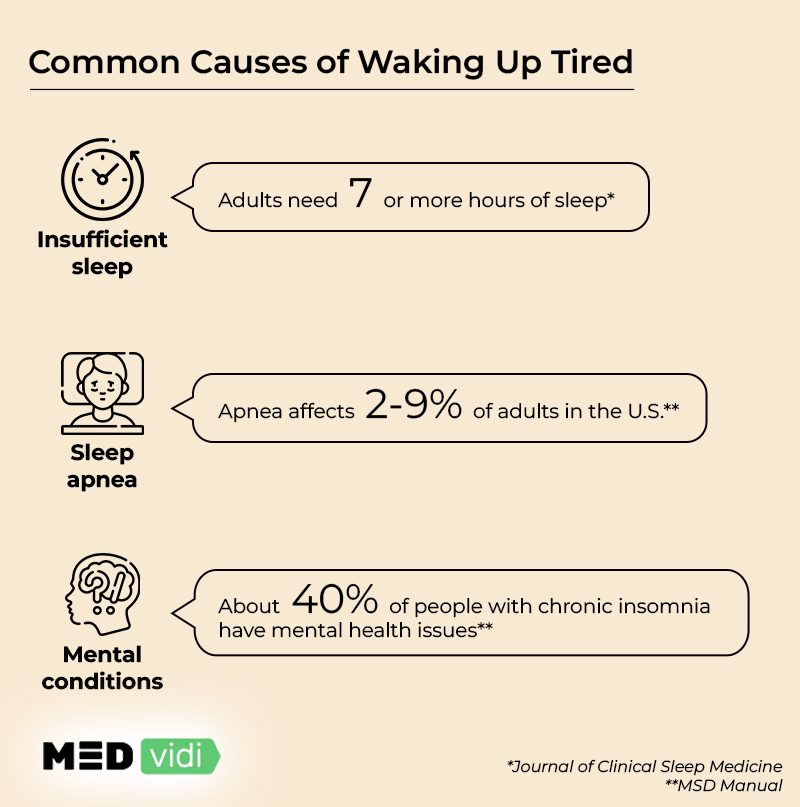Waking up in the morning after a long night’s sleep usually feels refreshing. Research shows sleep is
If you wake up tired once, you can probably fix it with a hot shower and coffee. But if you’re always waking up tired with no energy to perform your morning routine, you have a serious cause for concern. Here are possible reasons why you keep waking up tired every day and tips for fixing it.
Sleep problems may seriously disrupt your normal life. Avoid such consequences with professional help.
Sleep Inertia
Despite following your ideal sleeping schedule strictly, you might rarely experience grogginess upon waking up. Sleep inertia results from insufficient sleep, waking up suddenly from a deep sleep state, and setting your alarm earlier than usual. It can be
Sleep Disorders
If feeling tired after sleeping continues for a long time, you might be struggling with a sleeping disorder, such as:
- Insomnia. It’s a common problem affecting a
third of the adult population[4] . People with insomnia find it difficult to fall asleep and remain that way until morning. - Restless leg syndrome. It’s a neurological disorder that makes you want to move your legs, especially when resting or sleeping.
- Periodic limb movement disorder. This condition usually co-occurs with restless leg syndrome. It causes the leg to twitch, jerk, or flex when sleeping. Movements happen once or a few times in a minute and may lead to sleep disruption.
- Bruxism. It’s associated with teeth grinding and subconscious jaw clenching when sleeping and sometimes when awake. If it happens frequently, it might lead to waking up tired with a headache.
- Sleep apnea. It’s a disorder where a person stops breathing several times when sleeping. It’s associated with snoring and can lead to waking up frequently at night.
The causes of sleeping disorders vary, and patients may need help identifying them. Treatment also depends on the type of the disorder, its causes, symptoms, and individual specifics.
Anxiety and Depression
Anxiety leads to too much worrying, which makes it hard for the mind to switch off and sleep. On the other hand, depression leads to persistent feelings of sadness and low mood, which leads to fatigue. Both conditions can lead to sleep problems and contribute to waking up exhausted.
Other Causes for Waking Up Tired and Having No Energy
- Poor sleeping environments, such as noise, uncomfortable mattresses, and unconducive temperature.
- Drinking too much alcohol leading to hangovers.
- Taking too much caffeine close to bedtime.
- Having medical conditions such as chronic fatigue syndrome, anemia, chronic kidney disease, etc.
Get personalized treatment for depression, anxiety, or insomnia online.
How to Fix Morning Tiredness
If you wake up tired, it can disrupt your usual lifestyle. It might be hard to escape the morning grogginess, but you can take action to boost your energy and remain productive throughout the day. Below are some recommendations on what you can do.
- Improve your sleep environment. Some of the reasons you might wake up tired include insufficient sleep quantity and quality. One way to overcome that is by improving your sleeping conditions. Ensure you have a comfortable mattress and warm blankets. The temperature should be optimum, and the room should be dark with minimum noise. The more comfortable you’re, the more likely you’ll fall asleep. Also, skip the alarm when you can wake up yourself. Waking up naturally can make you feel more refreshed than waking up due to alarm disruption.
- Set up a morning routine. If you are still tired in the morning after sleeping on a comfortable mattress for eight hours and ensuring minimal noise, try a new morning routine. First, take a glass of water since your
brain needs it[5] to boost your focus. After all, spending eight hours in bed can make you dehydrated. Second, beat fatigue through morning exercises. Take some morning jogs, hit the gym, or do some stretching. Then, after breaking enough sweat, wash it off with a hot shower. Finally, take that coffee or your favorite morning beverage to stimulate your mind and kick off the day. - Check for the underlying condition. Sometimes, having problems sleeping and waking up tired is a symptom of an underlying condition. The best option under such circumstances is to seek treatment. It’s likely that when the condition improves, you’ll get better sleep and start waking up refreshed. Mental health issues may impair sleep too. In the case of getting diagnosed with anxiety or depression, you can opt for cognitive behavioral therapy, medications, or other treatment options recommended by your doctor.
Other things you can do to stop feeling tired after sleeping include:
Avoiding or minimizing the use of alcohol.
- Avoiding blue light at bedtime and setting your phone to silent mode.
- Engaging in sleep-inducing activities like listening to soft music, white noise, or reading a book.
- Sticking to a sleep schedule by going to bed and waking up at the same time every day.
Receive personalized recommendations and sleep medications online.

Banish Morning Fatigue
Waking up tired is a common problem, with many diverse causes, which include underlying health conditions and one’s lifestyle. You can avoid feeling tired when waking up by ensuring you get the right quality and quantity of sleep. Some of the solutions you can try include sticking to a sleeping schedule, seeking treatment for the underlying conditions, and improving your sleeping environment.
If waking up tired disrupts your day, seek professional help. Get a doctor’s diagnosis to understand the problem’s cause and find a suitable treatment. Combining treatment with the above tips can make your sleep more refreshing.










